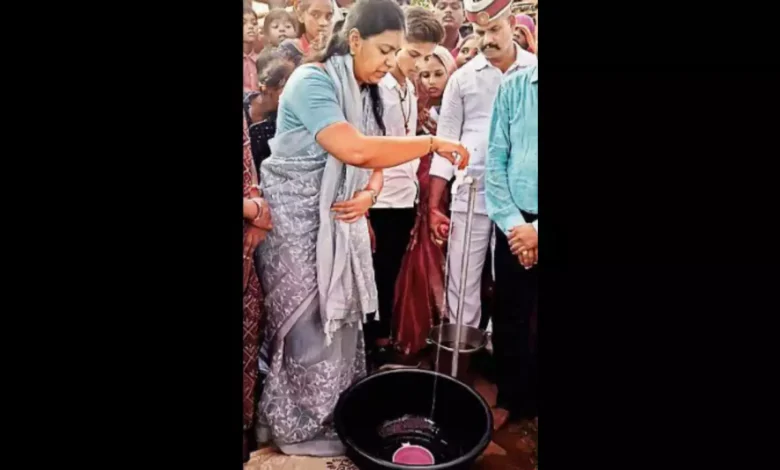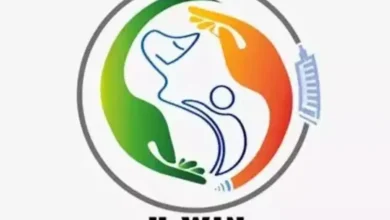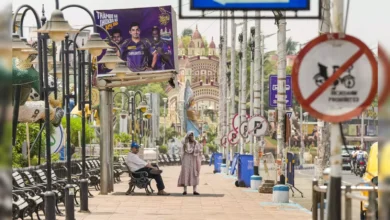Mirzapur’s Lahuria Dah village celebrates first piped water after 76 years of independence
Expert geophysicists and technical experts were enlisted to navigate this obstacle, leading to the successful installation of water supply lines

After nearly 76 years since India’s independence, Lahuria Dah village in the picturesque hills of Mirzapur, Uttar Pradesh, has finally welcomed a piped water supply. Previously reliant on a dwindling nearby spring and costly tanker deliveries, the 1,200 residents now have access to clean water directly from taps, significantly enhancing their quality of life.
Last August, six-year-old Shivansh experienced the simple joy of playing in the water for the first time. This long-awaited pleasure became a reality with the inauguration of the piped water supply in Lahuria Dah village.
Through collaborative efforts between the local administration and determined villagers, it was accomplished in spite of numerous challenges. Kaushalendra Gupta, a village resident, recounted years of grappling with water scarcity, which often depleted their entire annual budget. Despite a failed attempt at a water supply project in the past, renewed hope emerged with the intervention of District Magistrate Divya Mittal.
With fresh funding and collective action, a new project worth over Rs 10 crore was initiated, addressing Lahuria Dah’s persistent water woes. The journey towards piped water supply was arduous, with Lahuria Dah’s rocky terrain posing a significant challenge. Expert geophysicists and technical experts were enlisted to navigate this obstacle, leading to the successful installation of water supply lines.
Through joint efforts involving governmental agencies like the Jal Jeevan Mission and UP Jal Nigam, a suitable technology was identified and implemented. Finally, on August 31, 2023, tap water flowed in Lahuria Dah village for the first time. This achievement signifies more than mere convenience; it marks a fundamental improvement in the villagers’ standard of living.
Rainwater harvesting initiatives and the creation of an artificial dam-cum-pond further enhance water security, benefiting both humans and animals. Situated approximately 49 km from Mirzapur district headquarters, Lahuria Dah boasts a diverse population comprising Kol, Dharkar, Yadav, Pal, and Kesharwani communities. This milestone serves as a testament to collective action and offers hope to marginalized communities facing similar challenges across India.
The Jal Jeevan Mission
11 Crore Rural Households Now Have Access To Tap Water. This milestone, achieved through the Jal Jeevan Mission, marks a transformative journey toward ensuring clean drinking water for every rural home. Launched by Prime Minister Narendra Modi on August 15, 2019, the mission aimed to provide tap water connections to all rural households by 2024. At its inception, only 16.72% of rural households had access to tap water, but within three years, this figure has surged to 56.84%. Prime Minister Modi has praised this achievement, acknowledging the efforts of those on the ground and congratulating all beneficiaries of the Jal Jeevan Mission.
Union Minister for Jal Shakti, Gajendra Singh Shekhawat, hails the vision of Prime Minister Modi and the relentless pursuit of the mission’s goals, crediting the dedicated efforts of the ministry and its team for this remarkable milestone. The impact of tap water supply extends beyond mere convenience. It alleviates the burden on women and young girls who no longer have to fetch water, enabling them to engage in income-generating activities and pursue education.
Moreover, by providing tap water connections in schools and Anganwadi centers, the mission promotes hygiene, health, and education among children. Currently, 85.79% of schools and 81.75% of Anganwadi centers have tap water connectivity, with several states and union territories nearing 100% saturation. Implemented as a decentralized, demand-driven program, the Jal Jeevan Mission empowers local communities to manage, operate, and maintain water supply infrastructure.
Over 5.20 lakh Village Water and Sanitation Committees have been formed, facilitating community participation. Additionally, more than 17 lakh women have been trained to test water samples using Field Test Kits, empowering rural women and ensuring water quality.
You might also be interested in – Mirzapur cab driver crushes passenger to death for supporting Modi-Yogi in UP



